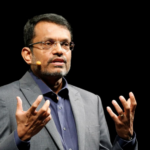
MAS’ Ravi Menon Calls for Collective Action to Tackle Insurance Gaps
by Fintech News Singapore October 31, 2023Ravi Menon, Managing Director of the Monetary Authority of Singapore (MAS), highlighted critical issues surrounding Asia’s insurance protection gaps in a keynote address at the 19th Singapore International Reinsurance Conference.
Menon emphasised the significant data gaps in Asia’s insurance landscape and called for collective efforts to improve risk mitigation, address data deficiencies, and expand insurance capacity.
In his speech, he pointed out that data is fragmented and unstandardised across various stakeholders. He urged the creation of trusted platforms for data pooling to support informed risk underwriting. Initiatives like the Global Resilience Index and the Global-Asia Insurance Partnership’s pandemic risk database aim to provide comprehensive data for decision-making.
He also stressed the importance of public-private partnerships to inform policymaking with insights from insurers and reinsurers. He provided examples of how data can be used to design flood-resilient features and guide agricultural practices for better flood resilience. Similarly, collaboration between the insurance industry, cybersecurity sector, and policymakers could help enhance cybersecurity measures.
Given Asia’s significant protection gaps, Menon highlighted the need for alternative risk transfer methods. He mentioned insurance-linked securities (ILS), captive insurance, and sovereign catastrophe risk pools as key initiatives. ILS can mobilise additional risk financing from capital markets, while captive insurance allows corporations to tailor risk protection to their needs. Sovereign-focused risk pools provide viable options for countries with vulnerable communities.

Ravi Menon
He concluded,
“The reinsurance industry is an important partner for helping Asia realise its growth opportunity by helping to manage risks, through effective risk financing solutions and risk mitigation insights.
With strong collaboration across the insurance ecosystem, policymakers, businesses, and academia, we can secure a more resilient future in Asia.”





